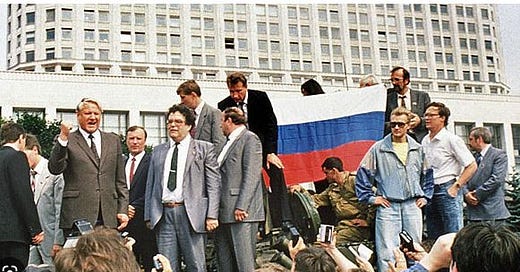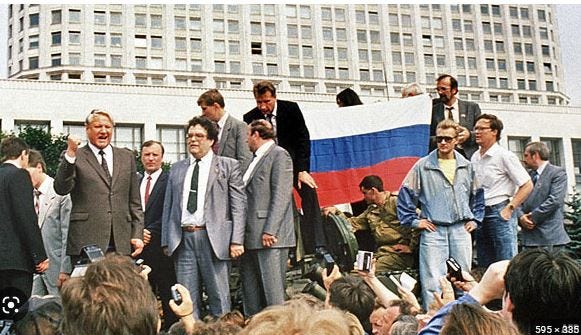The third view about the origins of the conflict looks at the roots of the current nationalism. It starts from the historical events of 1989-1992 which led to the fall of communism. The fall of communism was not precipitated by democratic revolutions as is often claimed in the popular narrative in the West. These were in reality revolutions of national liberation from the indirect rule by the Soviet Union. They took the seemingly democratic form because of a broad agreement on national self-determination among many sections of the population in 1989. Thus nationalism and democracy were fused and it was difficult to distinguish them. This was especially so in countries that were ethnically homogeneous like Poland or Hungary: nationalism and democracy were the same, and it is understandable that both domestic revolutionaries and the Western observers preferred to emphasize the latter and to downplay the former (nationalism). We can distinguish the two only when we look at what happened in multi-ethnic federations.
No theory which sees democracy as being the guiding light of the 1989 revolutions can explain the fact that all communist ethnic federations broke up. For if democracy was the main concern of the revolutionaries there was no reason for such federations to break up once they became democratic. Moreover the break-up does not make sense at all within the broader liberal narrative which takes multiculturalism in addition to democracy (or even as a part of democracy) as a desideratum. If democracy and multiculturalism were the guiding forces of the 1989 revolutions then the federations of the Soviet Union, Czechoslovakia and Yugoslavia should have survived. The fact that they did not clearly indicates that the leading forces behind the revolution were those of nationalism and self determination.
Further, as I mentioned, the theory of the democratic nature of the revolutions of 1989 cannot explain why all conflicts and wars have taken place in the dissolved communist federations, and why 11 out of 12, including the current war in Ukraine, are the ethnic conflicts about the borders. Such conflicts have nothing to do with the type of internal political arrangement or government (democracy vs autocracy), but they have a lot to do with conquest of territory, nationalism, and desire of minorities which happen to be in the “wrong” states to have their own states or to join a neighboring state. These elementary facts are almost never mentioned in the mainstream story-telling. There is a good reason for it: they run against the simplistic “democratic narrative.”
The fourth theory takes its starting point from the third but goes a step further. It does ask the crucial question, ignored by all other theories: whence did nationalism that led to the break-up of ethnic federations come from? The answer has to be sought in the constitutional set-up of communist federations and in economics. As is well-known, communists tried not only to solve the economic problems linked with capitalism, but also the ethnic problem which has bedeviled Eastern Europe for several centuries. They followed broadly speaking the Austro-Marxist approach that evolved from arguing for personal autonomy to favoring national self-determination. This is why the Soviet Union was created as a federation of ethnically based states. The Soviet Union should have transcended the ethnic issue by giving each ethnicity its own republic, a homeland. The Soviet Union, in this view, provided the blueprint for a future global federal state that would also be composed of nationally-based states that fulfilled two functions: provision of national security to its members and fast economic development thanks to the abolition of capitalism. The same approach was adopted by two other ethnic federations: Czechoslovakia and Yugoslavia.
That approach made lots of sense on paper and would have probably solved the ethnic problem had communism delivered on its promise of fast economic growth.
The reason why communist federations failed to solve the ethnic problem became much more obvious in the 1970s. The principal reason lied in the economic failure to catch up with the developed West. As that failure became more apparent, under the condition of a single party system the only legitimacy that different Communist party elites could seek was to represent themselves as the standard bearers of national interests of their own republics. In the absence of market relations and with arbitrary pricing, every republic could claim to have been exploited by the others. The republican elites latched on that to become more popular at home (in their republics), and, in the absence of elections, to garner some legitimacy. They were helped by the fact that the republican political structures were considered legitimate structures within the one party state. The republican elites did not thus have to go outside the existing political system (which would have rendered them liable for repression) to obtain the mantle of legitimacy and popular support. Ironically had these republican structures not existed, that is, were the multinational states simple unitary states, then the local communist elites would not have had the tools nor the political basis from which to challenge other elites and project themselves as defenders of national interests. By doing so, however, they also created the basis for the spread and acceptance of nationalist ideologies that eventually broke up the countries.
Thus to get a better understanding of the current war it is important to go back into history. What we observe today is caused by two factors: first, the unsuccessful economic development of the formerly communist countries, and second, the structural political setup that enabled republican elites to cover-up the economic failure by defending the nationalist interests of their constituents. The latter was both an easy solution, and was permitted by the way the regime was organized. If one argued for the return to capitalism, he was likely to end up dismissed from his job, or in jail. But if one argued that his republic was unequally treated, he was likely to climb up the ladders of power.
Legitimation of the national interest as such provided then for the legitimation of nationalist ideologies and ultimately for the desire for national independence, and the wave of nationalism that motivated and followed the revolutions in 1989. The moving force of these revolutions was the same in both ethnically homogeneous and ethically heterogeneous countries: it was nationalism. But nationalism in the first group of countries coalesced with democracy, and nationalism in the latter group of countries, because of unresolved territorial issues, led to wars. Russia was slow to move to a strong nationalist posture, and its reaction can be seen as delayed. But because of its size, large population and enormous military, it represents a much greater threat to peace once nationalism is dominant. For obviously a very small state with the same nationalist ideology is much less of a threat to the world peace than a state with 6,000 nuclear missiles.
Without seeing that the roots of the current conflict are historical and are lodged in the initial setup of communist federations and in the economic failure of the communist model of development, we are unlikely to understand the current conflict, all the unresolved one, and possibly even those that may yet come.




Great analysis. Best and most precise description of the crisis.
In several key aspects, situation in Russia and Ukraine was similar to former Yugoslavia. One has to wonder how will economy and politics determine destiny of Ukraine and Russia in the following years and decades.
Not sure how to read the implications of the main thesis:
such conflicts [as they have taken place in dissolved communist federations] have nothing to do with the type internal arrangement or government, but they have a lot to do with conquest of territory, nationalism, and desire of minorities which happen to be in the “wrong” states to have their own states or to join a neighboring state
for an eventual way out of the conflict in Ukraine. Is the Donbas populated by a minority driven by a desire to join Russia? Or is Russian nationalism incompatible with the continued existence of Ukraine as such? If the latter was the case, however, would not the ‘Russian imperial reflex’ explanation be essentially correct?
The economic dimension however deserves a closer look.
The economic failure of communist regimes is presented as allowing the resurgence of nationalism in the communist world.
This raises an interesting question about the trajectory of post-communist economics. If Ukraine has been a singular economic failure in the post-communist world, Russia has arguably been an economic failure relative to the former communist countries that joined the EU.
For this reason the Russian minorities in the Baltic States are unlikely to be consumed by a desire to join Russia. When highlighting the ethnic divisions in Ukraine arch-realist Mearsheimer shows a poll, where the relative strengths of those in favour of greater integration with the EU (blue) of Russia (red) differ sharply across regions. He fails to note, however, that even in the most pro-Russian regions the ‘reds’ are weaker than the ‘blue’ (as if Democrats outnumbered Republicans even
In the reddest states). In other words, given the choice, even the pro-Russian minorities would on balance prefer staying in an Ukraine joining the EU rather than reuniting with the ‘motherland’. One is tempted to conclude that post-communist economic failure of Russia - at least relative to the former communist countries that were able to join the EU - is fanning Russian nationalism and this the root driver of the conflict, rather than ethnic divisions in Ukraine. Difficult to see a solution.